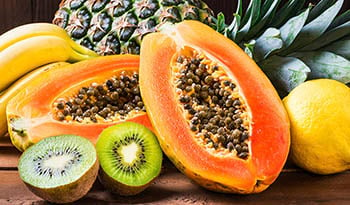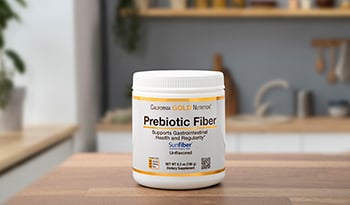Emésztőenzimek az élelmiszer-intolerancia elősegítésére

Élelmiszerallergia vagy élelmiszer-intolerancia akkor fordul elő, ha az élelmiszer lenyelése mellékhatást fejt ki. A két kifejezés közötti különbség az, hogy egy klasszikus ételallergiában az immunrendszer részt vesz abban, hogy valódi allergiás reakciót idézzen elő súlyosabb tüneteket, míg az ételintolerancia esetén a tünetek általában kevésbé súlyosak, és gyakran emésztési problémákra korlátozódnak.
A klasszikus ételallergia akkor fordul elő, amikor egy lenyelt élelmiszermolekula kölcsönhatásba lép az immunrendszerrel, ami hisztamin és más allergiát termelő vegyületek felszabadulását eredményezi, amelyek duzzanatot és gyulladást idézhetnek elő. Élelmiszer-intolerancia esetén a kiváltó ok az, hogy bizonyos ételeket nem lehet emészteni az emésztőenzim hiánya miatt. Például a felnőttek körülbelül 65% -ának csökkent a laktóz emésztési képessége csecsemőkor után. Laktóz, a tejben és tejtermékekben lévő cukor, amelyet a vékonybélben termelt laktáz enzim lebont. Ha a laktózt a laktáz enzim nem bontja le, sok gyomor-bélrendszeri tünetet okozhat, különösen gázt, puffadást, görcsös fájdalmat és hasmenést. A kiegészítő laktáz enzim szedése segíthet a laktáz emésztésében, és lehetővé teszi a laktóz intoleranciában szenvedők számára, hogy megszüntessék ezeket az ételintolerancia tüneteit. Ne feledje azonban, hogy sok laktóz-intoleráns embernek nehézségei vannak a tejfehérjék lebontásával is. Ezért azok a termékek, amelyek a laktázt fehérjeemésztő enzimekkel (proteázokkal) kombinálják, általában sokkal jobb választás.
Emésztőenzim-kiegészítők használata élelmiszer-intoleranciában
Az emésztőenzim kiegészítése nemcsak javíthatja az élelmiszer-intolerancia étrendi megközelítéseit, sok esetben az enzimkiegészítés hasznosabb lehet, mint az étrendi változtatások. Sok élelmiszer-intoleranciában szenvedő ember profitál egy 14 napos, nagy hatékonyságú emésztőenzimkészítménnyel végzett vizsgálatból. Ideális esetben olyan, amely az enzimek fő kategóriáinak különböző változatainak keverékét tartalmazza, különböző pH-aktivációs tartományokkal, így az enzimek hatékonyak az egész gyomor-bél traktusban. A legtöbb emésztőenzim nagyon szűk pH-tartományon belül hatékony vagy aktív, és mivel az emberi gyomor-bél traktus pH-ja nagyon savtól lúgig változik, a legtöbb enzimkiegészítő nem hatékony az egész gyomor-bél traktusban. Tehát bár az enzimkiegészítő hasznos lehet az emésztőrendszer egyik részében, egy másikban teljesen inaktív lehet. A gondosan összekevert enzimek keverékeinek felhasználásával kimutatták, hogy 3-szor erősebben működik, és több mint 6-szor gyorsabban működik, mint más enzimkészítmények vezetése.
A 14 napos kihívásban egyszerűen vegyen be egy vagy két kapszulát az enzimkiegészítőből minden étkezés előtt 14 napig. Az emésztés javítása kiegészítő enzimekkel gyakran szükséges az élelmiszer-intolerancia kiküszöböléséhez.
Segíthetnek-e az emésztőenzimek a gluténérzékenységben?
Igen, olyan termékek, amelyek kombinálják a proteázoknak nevezett fehérjeemésztő enzimeket és a specifikus gluténemésztő enzimet, dipeptidil peptidáz IV (DPP-IV), valóban segíthetnek. Itt van egy gyors frissítés. A glutén a fő fehérjekomplex, amely elsősorban a gabonafélékben található, beleértve a búzát, az árpát, a tönkölyt és a rozst. Sok embernek van intoleranciája a gluténre, valamint a kazeinre, amely a tejben található fehérje. Intoleráns egyének lenyelésekor ezek a fehérjék gyomor-bélrendszeri kellemetlenségeket okozhatnak, különösen gázt és puffadást.
Bár a glutén- és kazein intolerancia népszerű megoldása a gluténmentes, kazeinmentes étrend követése, és a sértő fehérjék kiküszöbölése csökkenti a kényelmetlenséget, az élelmiszerekben gyakran vannak rejtett glutén- vagy kazein forrásai, amelyek továbbra is kellemetlenséget okozhatnak.
Számos gluténmentes termék érhető el a természetes élelmiszerek üzleteiben, sőt a mainstream szupermarketekben is. A gluténforrások helyettesítésére hasznos gabonafélék közé tartozik az amarant, a quinoa és a különféle rizs, például barna, piros, fekete és vad rizs. A kazein megtalálható a tejben és a tejtermékekben. Nyilvánvaló, hogy a glutén és a kazein elkerülése esetén gondosan olvasni kell az élelmiszerek címkéit.
A kiegészítő emésztőenzimkészítmények segíthetnek az embereknek tolerálni az alacsonyabb glutén- vagy kazeinbevitelt, különösen a glutén és/vagy a kazein elkerülésének kezdeti szakaszában. Keressen olyan termékeket, amelyek dipeptidil peptidáz IV (DPP-IV) tartalmaznak. Ez az enzim mind a gliadint, mind a kazeint célozza meg, és ellenáll más emésztőenzimek általi lebomlásnak. Úgy gondolják, hogy a DPP-IV az egyik kulcsfontosságú enzim, amely felelős ezen fehérjék emésztéséért, és ismert, hogy kisebb mennyiségben található a gluténérzékeny és intoleranciában szenvedő egyének bélnyálkahártyájában. Valójában fordított kapcsolat van a DPP-IV szintje és a gluténérzékeny emberek bélkárosodása között. Más szavakkal, minél alacsonyabb a DPP-IV, annál jelentősebb a bélnyálkahártya károsodása. A DPP-IV-t tartalmazó készítményeket gyakran ajánlják a rejtett gluténforrások elleni védelem érdekében.
Végső megjegyzések
Az emésztési panaszok közel minden negyedik embert érintenek. A legtöbb esetben a tünetek inkább a zavart emésztési funkciót vagy az élelmiszer-intoleranciát tükrözik, mint az alapbetegséget. A funkcionális gyomor-bélrendszeri rendellenességek közé tartozik az alkalmi emésztési zavar vagy gyomorégés, funkcionális dyspepsia, túlzott puffadás és irritábilis bél szindróma (IBS). Az emésztés támogatása az emésztőenzim készítmények és más természetes megközelítések alkalmazásával gyakran a legjobb út e zavaró (és néha kínos) tünetek kiküszöbölésére.
FELELŐSSÉGKIZÁRÓ NYILATKOZAT:A jelen blognak nem célja diagnózis felállítása...

















































































 Tartalomjegyzék
Tartalomjegyzék















